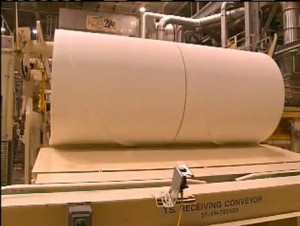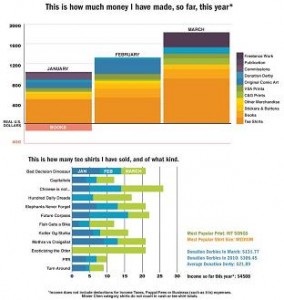
To start, a few things missed in yesterday’s post: I got a copy of the minicomic pre-release pre-view of Tracy White‘s How I Made It To Eighteen, and it looks like powerful stuff. Speaking of power, R Stevens was rocking a beta-test iPhone dongle that allowed him to swipe credit cards, have customers sign on the screen with a finger, and optionally supply an email address so that a receipt could be sent. Wow. Also, I missed getting back to a gentleman that had an interesting-looking self-published comic book done entirely from typography, and (because I’m an idiot) didn’t get his name. If you’re he, drop me a line.
So, if you didn’t catch my tweets the other day, NPR devoted nearly ten minutes of airtime on Sunday’s All Things Considered to Youtube darlings Pomplamoose and their do-it-yourself approach to a musical career. Listen especially to this exchange between host Linda Wertheimer and guests Nataly Dawn & Jack Conte, around the 3:40 mark:
WERTHEIMER: So is it totally old fashioned to think of a record label as the best way to become a hit band? My understanding is that ultimately, if you really want to make the big bucks, you’ve got to have the record label. You’ve got to have their distribution, their promotion. That is the way to go still.
Ms. DAWN: There’s no simple answer to the question, I don’t think.
Mr. CONTE: Yeah.
Ms. DAWN: I mean, if you can’t just do it all yourself, then you do need help. If, for example, you’re somebody who writes songs, like Lady Gaga, and you need everything, you know, that’s going to make you Lady Gaga, then you need a big, fat label. But if you’re just a band, I don’t think we’re in an era anymore where you need that sort of major backing.
Mr. CONTE: Yeah, I mean, what does it mean, really, to need a label? I mean, we’re making a living. We’ve got a sustainable business. We’re growing every year as a good business should. We’re happy. We don’t have to do things that we don’t want to do. We don’t have to please people that we don’t want to please. We get to make the music that we love.
Yeah, we’re not on the front page of Rolling Stone magazine, and we’re not getting $10 million checks in the mail, but we don’t need that to have a nice life.
Ms. DAWN: And also, our goal has never been to be a huge hit band. We just started…
Mr. CONTE: We want to make a living doing what we like to do.
Ms. DAWN: Exactly. We’re just making a living.
Wonder why I found that bit interesting? Also of interest was an exchange a bit later on the topic of rights (approximately 6:34):
WERTHEIMER: So what happens if Lady Gaga turns around and says: Wait a minute. Did I sell the rights to that song and just don’t remember it?
Mr. CONTE: Oh no, we make sure that we have all our ducks in a row. We bought mechanical licenses to all of our covers before we put them on iTunes. So it’s all legit and legal.
(Soundbite of laughter)
WERTHEIMER: We were sort of curious about that because I think that would be one of the parts of the process that wouldn’t be so cheap.
Mr. CONTE: Oh, yeah.
Ms. DAWN: Yeah. No…
Mr. CONTE: No, but it’s really easy. You go onto harryfox.com. You click buy mechanical license, and boom. You…
Ms. DAWN: That’s the thing. People think that, like, all of these things have to be done by, like, geniuses from, like, behind huge desks or at the top of skyscrapers, but actually you can just go online and do it yourself.
That put me in mind of Wil Wheaton’s experience getting some of the aforementioned Mr Stevens’s t-shirts on TV:
I got to pick out my T-shirts again, and since I was already wearing an Electric Sheep shirt from Diesel Sweeties, I suggested that the costume department may want to look at Rich’s store for ideas. Just like last time, when I suggested Penny Arcade, I was able to get permission from Rich almost instantly via text message. In the old days, this would have been a complicated, time-consuming, inefficient process involving FAXes, phone calls, and a whole bunch of bullshit. It delights me that it’s as simple now as grabbing my phone, sending a text message, and waiting for a reply.
Nearly twenty-five years ago, I first read William Gibson’s description of a specialized company competing against corporate giants: small, fast, ruthless … all Edge. Now, watching independent artists manage their business, nimble enough to turn on a dime, I think I’m finally seeing in action what Gibson had in mind.
The flip side to that, of course, is that the artists have to conduct themselves in a manner that keeps them fast-reacting (ruthless being a matter of opinion), which is tough to maintain over the long term. That being said, just as proto-mammals found a pretty good living on the scraps that behemoth dinosaurs left behind, there’s a lot of eyeballs and money that entertainment conglomerates just don’t know how (or don’t want to bother) to gather up. That’s your target, creators.
We’ll wrap it there; I’ve got some stuff in the mailbag that I want to get to, but I doubt anybody’s still reading after all those quotes. See you tomorrow.









